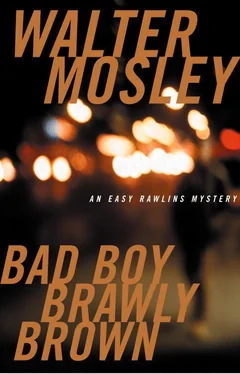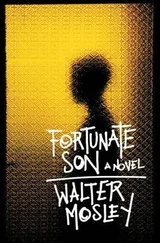“You think you could drop me off back at the restaurant?” he asked.
“Sure.”
I didn’t do anything, though. I didn’t start the car or move very much at all.
“So we gonna go?” Sam asked.
I lit a Chesterfield.
“This ain’t bar talk, Sam.”
“What ain’t?”
“Not one thing you heard today,” I said. “Not that Riverside house or Brawly Brown or the mention of army rifles. Loose lips ’bout any’a that shit get the man who said it dead.”
Sam brought his hand to his long throat, trying to hide his fear with a contemplative pose.
“Get his cousin killed,” I continued, “and be a threat to my own peace’a mind.”
I turned to him with whatever it was my face looked like when I was deadly serious. “This shit can get you killed.”
“I ain’t sayin’ a word, man,” Sam said.
I stared at him until he looked away.
Sam never tried to get under my skin again after that day. When I’d come into Hambones he’d be friendly, but there was no more sharp-edged banter or superiority on his part. I missed our old arguments but, on the other hand, I appreciated his fear.
By the time I got home the children had eaten and gone to bed. Bonnie was curled up on the sofa, reading a French novel in tight pants and a blue velvet shirt that was buttoned only halfway up the front.
When I walked in she came to me and kissed me. She didn’t ask why I was late or where I had been. She knew. She didn’t need me to apologize for being me. I felt, at that moment, that Bonnie had known me for my whole life.
Dinner was waiting on the stove. Baked chicken and rice under a peach gravy with brussels sprouts on the side. We ate and talked about her travels in Africa and Europe with Air France. She was a black stewardess working in three languages in a country I once considered living in because it seemed so much better than America.
“It’s better in some ways,” Bonnie once said when I suggested that we live together in Paris. “But it’s not without prejudice.”
“Do they hang colored people in the countryside?” I asked.
“No,” she said. “But that’s because in France they aren’t afraid of blacks, just certain that we are from a lesser culture. We are interesting, but in the end just primitives. At least here in America the white people I’ve met are afraid of Negroes.”
“And that’s better?” I asked.
“I believe so,” she said. It was a turn of a phrase that she’d learned along the way. Bonnie picked up things from the way people spoke and then used them in her own manner. “If you’re afraid of someone, then in some way you are forced to think of them as equals. It is not a child but a man you face.”
She was a deep soul and I was lucky for the time I had to spend with her.
That night we didn’t make love but just held each other. I listened to her breathing until it turned deep and I knew she was asleep. I drifted on behind her, murder just a distant thunder in my mind.
I had twenty-seven sick days accrued at that time and a pretty good union, so I called in sick the next morning and drove off to see John at his construction site.
He had on white overalls and old alligator shoes, one of which had worn through over the little toe. He wore a tool belt and a wristwatch with a thick gold band, and he was hammering away at a nail in an awkward, one-handed fashion.
“Hey, John,” I said.
“Easy.”
“I hope you using enough nails on that sucker,” I said.
“I done had to buy so many nails that I do believe these here houses could be called armored homes.”
We both laughed and clasped hands.
I suppose I was sensitive around that time. John and I rarely shook hands. We were real friends with no need to express our peaceful intentions. But that day there was an obstacle, maybe more than one, between us. We held on to each other to make sure that we didn’t get separated.
“I heard that you were out by my house yesterday,” he said.
“I needed to get the truth from her, John. You know I couldn’t do that with you in the room.”
“That truth gonna help you find Brawly?” There was an angry edge in his tone.
“Findin’ him ain’t gonna be nearly as hard as savin’ him.”
“What’s that supposed to mean?”
“Alva was right,” I said. “Brawly’s in sumpin’ bad.”
“It’s them First Men,” John said.
“Some of ’em,” I agreed. “But it’s more than that, too.”
“What more?”
“I’m not sure yet,” I said. “But did you know that Henry Strong, one of the mentors to the First Men, used to come around here and see Brawly?”
“No.”
“Did you know that Aldridge Brown used to come around to see his son, too? They had lunch together more than once.”
“I don’t believe it. Brawly hated Aldridge.”
“Did he tell you that?”
“Alva did,” John said. “He’s her son. She should know.”
“Your mother’s still alive, ain’t she?” I asked.
“You know she is.”
“You tell her everything you feel? You always tell her the truth? I mean, Brawly knows how his mother feels about Aldridge. Why would he tell her if they squared up and started talkin’ again?”
“Maybe that’s true,” he said. “But even if it is, how’d you find out?”
“I came out here one day when you were gone and talked to Chapman and Mercury. They told me because I asked.”
“And here they supposed to be my men.”
“They wouldn’ta said anything if I didn’t ask, John. And you know we go back. Me an’ Mouse pulled their fat outta the fire when they robbed those dockworkers.”
“Okay,” John said. “So Strong and Brawly’s father came out here. So what?”
“So what if Brawly killed Aldridge? Strong, too? I caught a glimpse of the man who shot him. It could’a been Brawly, I don’t know.”
“So? What you sayin’?”
“If Brawly killed them people, he’s way past a good talkin’-to and sowin’ his wild oats. What you want me to do if he’s a double murderer?”
John looked at me, taking long, slow breaths. I had counted six exhalations when he asked, “How was Strong killed?”
“Ambushed, chased down like a dog, and then shot in the back of his head.”
John did not like that.
“Could you just walk away?” he asked.
“I’m in it already, John. The police know I’m in it. They are, too.”
“I knew I shouldn’ta called you, Easy. I didn’t want to, but Alva needed to feel like she was doin’ somethin’. She had lost him for so many years and there she was, losin’ him again.” John bit his lip and shook his head slowly. “She asked me to bring you in, so what could I say?”
“I don’t know.”
“Find out, Easy. Find out what happened.”
“And if she lose the boy?”
“She still got me,” he said.
Mouse had been my closest friend since I was a child, but I never respected any man as much as I did John. He was taciturn with a mean temper, but in the end you could always count on him to do what was right.
“Mercury and Chapman out around here someplace?” I asked.
“Chapman is,” John said. “Mercury quit.”
The fever I’d been feeling for days broke at that moment. Half the puzzle fell into place and I wondered, as one always does in hindsight, why hadn’t I seen it before.
Chapman was applying a rough coat of plaster to a three-beamed wall when John and I walked in.
“John,” Chapman said. “Mr. Rawlins.”
He had a splotch of plaster on the side of his broad nose and plaster in his hair. Chapman had straightened hair that he combed down the back of his neck. With his light skin, heavy features, and straight hair, strangers often had trouble guessing his racial background.
Читать дальше












